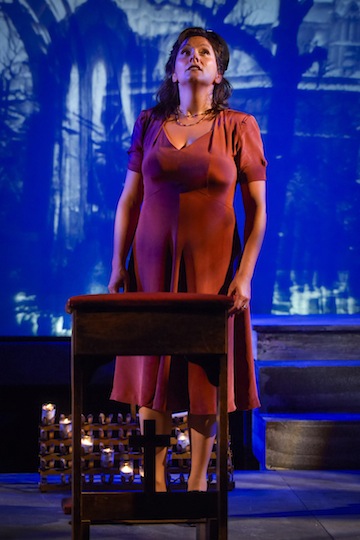
Meeting God on stage
As part of its summer season West Edge Opera presented three operas in its experimental theater site at the Ed Roberts campus in Berkeley. Experimental because the campus atrium was not designed specifically for performance, nor had the company used the space before. The campus was designed to be an open, easily accessible space for resources and support of those living with disabilities. Part of West Edge’s challenge was to see how this large two-story triangular space could be used for three very different operas. The space is blessed with airy light and good acoustics.
Along with La Bohème and a lively and thoroughly fun chamber opera, Hydrogen Jukebox, by Philip Glass using Allen Ginsberg’s rhythmically savvy poetry, the company’s directors mounted The End of the Affair, an opera by San Francisco-based composer Jake Heggie. Jake Heggie has a propensity for operas that examine our relationship to God, our commitment or lack of commitment to the divine. Among them are Dead Man Walking, Moby Dick and The End of the Affair. Director Mark Streshinsky chose to present the opera in a more traditional audience-as-fourth-wall way. That seemed an appropriate choice for a complicated piece.
The End of the Affair, which premiered in 2004 at the Dallas Opera, is based on the roman-à-clef by Graham Greene. The novel is told by a young writer, Maurice Bendrix, involved in an adulterous affair with an upper-class woman, Sarah Miles, in London during World War II. Considered one of the great Catholic novels of the twentieth century, the novel’s core lies in a 40-page section of journal excerpts written by Sarah, in which she reveals the pact she made with God over her lover’s life.
Striking a deal
During an illicit meeting, the lovers are separated by a falling bomb, which collapses the front of Maurice’s house. When Sarah sees his hand stretched out under the debris, she believes he is dead, and prays to God to give him back his life. She will leave Maurice, the man she loves more than any other man she has loved, in exchange. Maurice isn’t dead, and Sarah feels forced to abandon their affair.
But even more relevant to the intent of the novel is the journal’s detailed recording of Sarah’s struggles with belief before and after bartering away her human lover for divine love.
Translating this internal struggle is a hard one to stage. And neither Heggie nor his co-librettists was moved to make the attempt, ultimately. What remains is simply the plot device of her divine bargain being the explanation for why she left Maurice. This, however, leaves a huge gap in the story. Sarah becomes a cipher. We have no idea why Sarah does what she does. Characters confirm that she is a kind person. But is she? Is she kind to Maurice? To her husband?
The long and splendid quartet between the four men who are involved in her life – her husband, Maurice, the detective hired to trace her infidelities, and the man the opera presents as the lover she turns to after Maurice – sing about what she means to them. She presents them (somehow) with “possibility”. She is an empty vessel for their romantic projections. As terrifyingly true as that might be in a misogynist and narcissistic male culture like that Greene was a part of, it also emphasizes the emptiness forced on the role.
It’s a role that requires mind-boggling charisma on the part of the actor who portrays Sarah. And although Carrie Hennessey has a thoroughly lovely voice, both pure and warm and easily capable of handling the high tessitura of the role, and has a suitable stage presence, the part demanded too much, theatrically.
Keith Phares used his handsome baritone to fill the emotional void, sending his jealousy out to man and God. And Philip Skinner caught the soul of the boarding school bred Henry Miles, whose life is dedicated to service over love, with his large full bass. Tenor Michael Jankosky sang Richard Smythe, another part mistranslated on stage by the writing team. Smythe is portrayed as Sarah’s lover, but as a rationalist his function was to help Sarah in her struggle against God. Another role distorted to make sense in the plot was Sarah’s mother, Mrs Bertram, sung lustily and engagingly by mezzo Donna Olson.
The music was lyrical, singable and pleasant, but at times I wanted it to have more punch. Jonathan Khuner led the musicians, wonderfully and worthily, as always.
An opera shouldn’t have to adhere to the source of its story. But if it veers from the original, it should make its own sense on stage. Despite the long explanatory recitatives, the opera fails to make sense on either a theatrical or philosophical level. Even so, enough of the original was left to keep everyone interested: it was never boring. And the production itself was successful: with many beautiful voices in dedicated performances. Definitely worth seeing.
– Jaime Robles
Photo: Carrie Hennessey as Sarah Miles faces God in The End of the Affair. Photo by mellopix.
